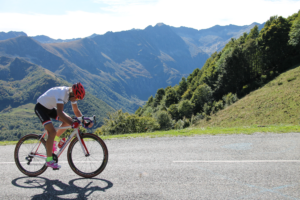FAQ
How fit do I need to be?
First point to make is that Pedal The Pyrenees is an endurance event! In fact you should think of it as 7 back to back endurance events.
You obviously, therefore, need to undertake some serious training for Pedal The Pyrenees. You will be riding with average climbing of 100ft/mile across the entire week. In comparison, the average ft/mile of climbing from Lands End to John O’Groats is only 50ft/mile.
You will be riding at higher than the average 100ft/mile ratio on several days with total climbing of 7000ft – 10,000ft per day. By the end of the week you will have ridden the equivalent of 1.5 times Mount Everest.
You need to be capable of riding successive days at that ratio, up to 80 miles per day.
Is climbing in The Pyrenees a bit like the Peak District but longer?
No! Climbing in the Pyrenees is a significant physical and mental challenge. The climbs are long, 10km – 19km, with a constant gradient averaging between 7% – 8%.
The climb of the Col du Tourmalet will take most riders around 2 hours – to put that into perspective, if a football match kicked off as you started the climb then by the time you reached the top, the game would have finished and the players would be having a post-match shower!
Are there time limits?
Yes. We have time limits on climbs in the early part of the week. We use these to assess riders’ capabilities and the impact that further climbs in the week will have, time wise, on the rest of the group and the Support Crew.
If you are outside of the time limits we will look at what are the best options to get you through the rest of the week. This may involve setting off earlier, or using the cars to get you to the bottom of climbs earlier, or even to the top so that you can descend the other side.
Is descending in The Pyrenees dangerous?
It is as dangerous as you choose to make it!
Climbing can be tough and the reward for your effort is the descent. However the descent could be lethal if you get it wrong. Going too fast is the most common mistake followed very closely by trying to brake whilst riding on the brake hoods.
Controlling your speed is essential at a rate you are comfortable with. Often the bends are blind and you will have no idea what is coming the other way. Also you may not know just how sharp the bend is, it could be 90 degrees or it could be a hairpin.
Riding on the drops of your handlebars will mean that you will find it easier to brake and to apply greater pressure on your brakes. Trying to brake from the hoods puts unnecessary strain on your hands, plus it is unlikely that you will get enough pressure to control your speed especially if it is wet.
What gear ratios do you recommend?
As a minimum you will need a compact front chain ring (50/34) and either a 30 or 32 tooth rear cassette.
Will I be cycling with riders of similar ability?
Ideally, yes. Typically the group of riders will split naturally into 2/3 groups of equal ability. So you can expect to be riding in a group of max 7 or 8 riders including 2 support riders in each group.
What will the weather be like?
Spring, Summer, Autumn, Winter! You will be riding in the high mountains so you should expect all kinds of weather and temperatures. Typically though at the end of September the temperature will be quite warm (25C is normal). Conversely the morning can be quite chilly and the high mountains can bring winter very quickly during any day.
What clothing should I bring?
You should bring suitable clothing for riding in all weather conditions – dry, wet, hot & cold. You should bring arm & leg warmers, waterproof jacket, overshoes, fingerless gloves, waterproof gloves.
For the evenings just suitable casual wear will suffice again accounting for both hot and cool conditions.
Is there a single room option?
No we do not offer a single room option. All of our riders will be sharing on a twin basis.
What are the arrival and departure points?
We will collect you at Biarritz Airport on the Saturday at the start of the ride, and deliver you to Perpignan Airport on the Sunday after the end of the ride.
